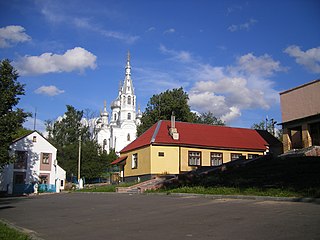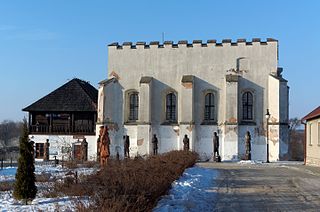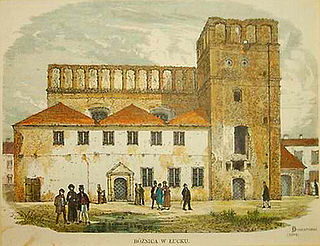
The Sejny synagogue is a former synagogue in Sejny, Poland, also called the White Synagogue in Sejny.

The Sejny synagogue is a former synagogue in Sejny, Poland, also called the White Synagogue in Sejny.
The large, Neo-baroque style building on Pilsudskiego Street was erected in the 1860s, replacing an older building. It was used by the Nazis as a fire station, the interior was gutted and all furnishings were destroyed. It was restored - with a plain, modern interior - in 1987 and now serves as a cultural center, theater and museum. [1]
Called the Borderland Foundation (Fundacja Pogranicze), the foundation and its cultural center are dedicated to the cultures of the region: Polish, Lithuanian, Belarusian, Jewish, Ukrainian and Russian.[ citation needed ] A Klezmer band is based at the cultural center.[ citation needed ]
The nineteenth century yeshiva building also survives, and is also used by the Borderland Foundation.[ citation needed ]

Kazimierz is a historical district of Kraków and Kraków Old Town, Poland. From its inception in the 14th century to the early 19th century, Kazimierz was an independent city, a royal city of the Crown of the Polish Kingdom, located south of the Old Town of Kraków, separated from it by a branch of the Vistula river. For many centuries, Kazimierz was a place where ethnic Polish and Jewish cultures coexisted and intermingled. The northeastern part of the district was historically Jewish. In 1941, the Jews of Kraków were forcibly relocated by the German occupying forces into the Krakow ghetto just across the river in Podgórze, and most did not survive the war. Today, Kazimierz is one of the major tourist attractions of Krakow and an important center of cultural life of the city.

Sejny is a town in north-eastern Poland and the capital of Sejny County, in Podlaskie Voivodeship, close to the northern border with Lithuania and Belarus. It is located in the eastern part of the Suwałki Lake Area, on the Marycha river, being a tributary of the Czarna Hańcza. As of 1999 it had almost 6,500 permanent inhabitants, with a strong seasonal increase during the tourist season.

Suwałki Region is a historical region around the city of Suwałki in northeastern Poland near the border with Lithuania. It encompasses the powiats of Augustów, Suwałki, and Sejny, and roughly corresponds to the southern part of the former Suwałki Governorate.

The Oświęcim Synagogue, also called the Auschwitz Synagogue, is the only active synagogue in the town of Oświęcim, Poland. The formal, as well as pre-war, name of the synagogue is Chevre Loymdei Mishnayos. It is now part of the Auschwitz Jewish Center, which includes a Jewish Museum, a cafe in the house of Shimson Kleuger and an education center.

Kamyenyets or Kamenets, also known as Kamyanyets, is a town in Brest Region, Belarus. It serves as the administrative center of Kamyenyets District. The town is located in the northwestern corner of Brest Region on the Lyasnaya River, about 40 kilometres (25 mi) north from Brest. The Leśna Prawa river flows through the town. In 2002, its population was approximately 9,000. As of 2024, it has a population of 8,287.

Yeshivas Etz Ḥayyim, commonly called the Volozhin Yeshiva, was a prestigious Lithuanian yeshiva located in the town of Volozhin, Russian Empire. It was founded around 1803 by Rabbi Ḥayyim Volozhiner, a student of the famed Vilna Gaon, and trained several generations of scholars, rabbis, and leaders. It is considered the first modern yeshiva, and served as a model for later Misnagedic educational institutions.

Zamość Synagogue is a UNESCO-protected Renaissance synagogue built between 1610 and 1618 in Zamość, southeastern Poland. Erected during the times of the Polish–Lithuanian Commonwealth, it functioned as a place of worship for Polish Jews until World War II, when the Nazis turned the interior into a carpenters' workshop. The structure was spared from destruction and in 1992 it became a UNESCO World Heritage Site alongside the Old City of Zamość.

Szydłów Synagogue was an Orthodox Judaism synagogue in Szydłów, Poland. It was built in 1534–1564 as a fortress synagogue with heavy buttresses on all sides. The synagogue was devastated by Nazis during World War II. During the war it served as a weapons and food magazine. After the war, it briefly served as a village cinema, but was eventually abandoned.

The Ibn Danan Synagogue is a synagogue in Fes, Morocco, dating from the 17th century. The synagogue is located in the Mellah district within Fes el-Jdid, one of the components of the historic medina of Fes.

The Synagogue in Chachmei Lublin Yeshiva is a synagogue located in Lublin, Poland, in the building of Chachmei Lublin Yeshiva, on Lubartowska 85 Street.

The Włodawa Synagogue in Włodawa, Poland is an architectural complex consisting of two historic synagogues and a Jewish administrative building, now preserved as a museum. The complex includes the Włodawa Great Synagogue of 1764–74, the late 18th century Small Synagogue, and the 1928 community building. It is "one of the best-preserved" synagogues in Poland.

The Tykocin Synagogue is a historic synagogue building in Tykocin, Poland. The synagogue, in mannerist-early Baroque style, was built in 1642.

The White Stork Synagogue is a nineteenth-century synagogue in Wrocław, Poland. Rededicated in 2010 after a decade-long renovation, it is the religious and cultural centre of the local Jewish community, under the auspices of the Union of Jewish Religious Communities in Poland. It is the only synagogue in Wrocław to have survived the Holocaust.

The Great Synagogue is a former Orthodox Jewish synagogue, located at 33 Karaimska Street, in the Jewish quarter of Lutsk, in Volynska Oblast, Ukraine. The congregation worshipped in the Ashkenazi rite.

The Mala Synagogue is one of the oldest extant synagogues in India and was built by the historic Malabar Jews of Kerala. It is located at Mala, a small town in Thrissur district of Kerala state in south India.

The Union of Jewish Religious Communities in Poland, is a religious association formed by Jews living in Poland who adhere to Judaism. It was originally created in 1949 as the Religious Association of Judaism, and renamed in 1992. The Association's seat is located in Warsaw, with seven administrative branches throughout the country. ZGWŻ consists of approximately 2,000 members (1998) congregating in nine municipalities. The Union operates seven active synagogues and 15 prayer houses. Also, ZGWŻ publishes its own periodicals, as well as the popular Jewish Calendar. Since 2003, the president of the Union is Piotr Kadlčik.

Krzysztof Czyżewski is a Polish author, one of the initiators of the Borderland Foundation in Sejny, Poland.

The Great Synagogue in Slonim, or simply the Slonim Synagogue, is a former synagogue building in Slonim, Belarus. Completed in 1642, the Baroque-style building is an historical and cultural monument of the Republic of Belarus.

The Great Synagogue of Brody, also known as the Old Fortress Synagogue, is a former Orthodox Jewish synagogue, located in Brody, in the Lviv Oblast of Ukraine. The congregation worshipped in the Ashkenazi rite. Constructed in the mid-18th century in the former Polish–Lithuanian Commonwealth, the building was significantly damaged by the Nazis in 1943, and has since fallen into disrepair.